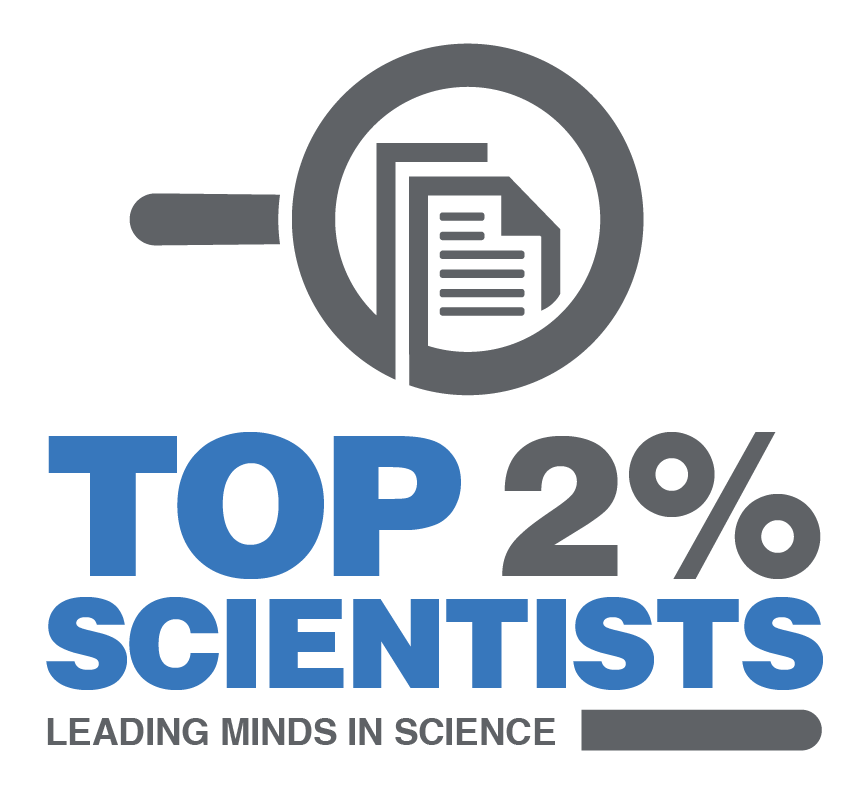About us
- Home
- About us


World's Top 2% Scientists
Stanford University's list of "World's Top 2%" scientists is based on a 2% or above percentile rank, or the top 100,000 by c-score (with and without self-citations). This prestigious list identifies the world's leading researchers, representing approximately 2% of all scientists worldwide. It encompasses standardised data on citations, h-index, and a wide range of bibliometric indicators. Researchers are classified into 22 scientific fields and 174 sub-fields, drawing from Scopus data provided by Elsevier through ICSR Lab.
Stanford/Elsevier's Top 2% Scientist Rankings
Stanford's Top 2% Scientists is an esteemed ranking that identifies the most cited scholars in their fields. This ranking, derived from Scopus database data, highlights researchers whose work has had a significant impact across various scientific disciplines.Methodology
The ranking is based on a composite indicator (c-score) calculated from six citation metrics:- Total citations (NC)
- H-index (H)
- Hm-index (H-index adjusted for the number of authors)
- Citations to single-author papers (NCS)
- Citations to single or first-author papers (NCSF)
- Citations to single, first, or last-author papers (NCSFL)
- The c-score combines these metrics to provide a comprehensive measure of a scientist's impact, accounting for both the quantity and the quality of their contributions.
Selection Criteria
Top 100,000 Scientists: Scholars are ranked based on their c-score, including and excluding self-citations. 2% Percentile: Scientists in the top 2% of their sub-field are also included. Field and Sub-field Classification Researchers are categorized into 22 scientific fields and 174 sub-fields based on the standard Science-Metrix classification.Data and Updates
- Career-long Impact: Metrics cover the entire career of a scientist up to the end of current year-1.
- Recent Year Impact: Metrics focus on citations received during current year-1.
- Latest Version: This latest version is based on the Scopus snapshot as of October 1, current year.
- Transparency and Accessibility: This is a publicly accessible database that includes standardized information on citations, h-index, co-authorship adjusted hm-index, and the c-score. Metrics are available with and without self-citations, and field-specific percentiles are included for all scientists with at least five papers.
Note: Inclusion in this list indicates high impact and recognition in the scientific community. Absence from the list does not reflect the quality of one's work.
Comprehensive Researcher Rankings
The World's Top 2% Scientists website provides a comprehensive ranking of the world's leading researchers across various scientific fields.
Powerful Search and Filtering Tools
The website offers powerful search and filtering tools that allow users to easily navigate and explore the vast database of top researchers.
Regular Data Updates with new rankings
The World's Top 2% Scientists website is committed to providing the most up-to-date information on the top researchers worldwide.
DISCLAIMER: This website is not affiliated with, endorsed by, or connected to Elsevier or Stanford University. We provide a user interface for data made available by Elsevier under CC-BY-NC-ND license.
About Our Data
The data presented on this website is sourced from Elsevier and Stanford University. We use this data under the Creative Commons Attribution-NonCommercial-NoDerivatives (CC-BY-NC-ND) license.- Data Source: Elsevier
- License: CC-BY-NC-ND
- Original Data: [Elsevier Data Repository]